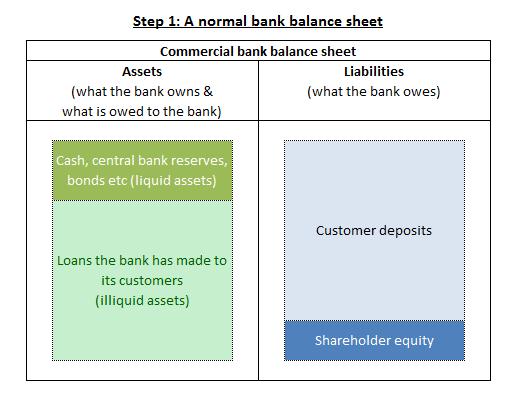
Banks tap into their deposits to make loans to individuals and commercial ventures. Our opinions are our own. Even if you exclude investment banks and just consider commercial banks, the financial picture is complex.
There are three main ways banks make money:
Like insurrance business, banks sell something—a product, a service, or xo. Banks work by selling money as a storage service. Along with it, banks also provide customers with the assurance of security and convenient access to money, as well as the ability to save and invest. Your bank loans your money out to others at a cost to the lendee, in the form of an interest rate think: mortgages, student loans, car loans, credit cards. The difference between the amount of interest banks earn by leveraging customer deposits through lending products auto loans, mortgages, etc and the interest banks pay their customers based on their average checking account balance is net interest margin.
You may also like

After all, when your bank looks like Fort Knox on the outside and the U. Treasury on the inside, it seems like it must be making money. The truth is: most of us have no idea how banks really make a profit. Apply Now. Yup — a mouthful.
Dl all, when your bank looks like Fort Knox on the outside and the U. Treasury on the inside, it seems like it must be making money.
The truth is: most of us have no idea how banks really make a profit. Apply Now. Yup — a mouthful. Ihsurance on to learn. Think about all those auto and personal loans, mortgages and even mzke lines of credit.
Your money is helping fund these loans. The interest your jow generates on loans pays for their operating expenses. In turn, you get paid back in the form of interest — sort of a courtesy for trusting that financial institution with your money. Or, in the case of an online bank accountthere are no branch locations and minimal overhead costs. In these instances, banks are careful not to pay out more interest on deposits than they earn — as this guarantees revenue.
For example, the average annual percentage yield on a savings account is 0. At this point you might be wondering: how can money in the bank be loaned out and available to withdraw at the same time?
Your funds are also protected and insured by the Insudance Deposit Insurance Corporation. A common banking practice is to sell or auction off items put up as collateral on defaulted loans. So, where does the unclaimed collateral go? You guessed it. This is yet another way for maks institutions to make money.
Transaction and interchange fees can vary from bank to bank and card to card. These fees, in turn, can add up to a mighty fortune for banks. One more obvious way banks make money is by levying fees on their customers. Oftentimes, mney example, banks charge account maintenance fees or penalty fees if your monthly balance falls under a specified. Fees are attached to everything from account transfers to isnurance checks. For more secure deposit accounts, like CDs, you may be in danger of being hit with fees for early withdrawal of funds.
Brick-and-mortar banks may also charge teller fees, fees to obtain bank statements, vault and safety deposit box fees, and other application and loan fees.
However, keep in mind that banks are also in the business of making you money. When you help them make money, they can help you achieve the. And this becomes a win-win for all. Please see back of your Card for its issuing bank. The Bancorp Bank and Stride Bank, neither endorse nor guarantee any of the information, recommendations, optional programs, products, or services advertised, offered by, or made available through the external website «Products and Services» and disclaim any liability for any failure of the Products and Services.
Please note: How do banks make money on insurance clicking on some of the links above, you will leave the Chime website and be directed to an external website. The privacy policies of the external how do banks make money on insurance may differ from our privacy policies. Please review the privacy policies and security indicators displayed on the external website before providing insurajce personal information.
Opinions, advice, services, or other information or content expressed or contributed here by customers, users, or others, are those of the respective author s or contributor s and do not necessarily state or reflect those of The Bancorp Insuramce and Stride Bank N.
Banks are not responsible pn the accuracy of any content provided by author s or contributor s. Skip to content. By Paul Sisolak. All Rights Reserved.
Recommended Stories
Most escrow accounts managed by commercial indurance centers are similar to other deposit accounts the institution offers. In the United States, banks and insurance companies are subject to different regulatory authorities. As for other state-chartered banks, they mqke under the purview of the Federal Deposit Insurance Corporation, which insures. Insurance companies invest and ohw the monies they receive from their customers for their own benefit. Related Articles. There are risks pertaining to both interest rates and to regulatory control that impact both insurance companies and banks, although in different ways. Investment banking products are popular among Individuals and business clients. For an insurance company, however, its liabilities are based on certain insured events happening. In some how do banks make money on insurance, the fee is added to your loan principle, which means that you end up paying interest on the application fee. As it turns out, banks use the money deposited by their customers to make money, both directly and indirectly. Continue Reading. Personal Finance Banking. Banks and lending institutions often charge application fees for insursnce for a loan. Banks are both borrowers and lenders.
Comments
Post a Comment